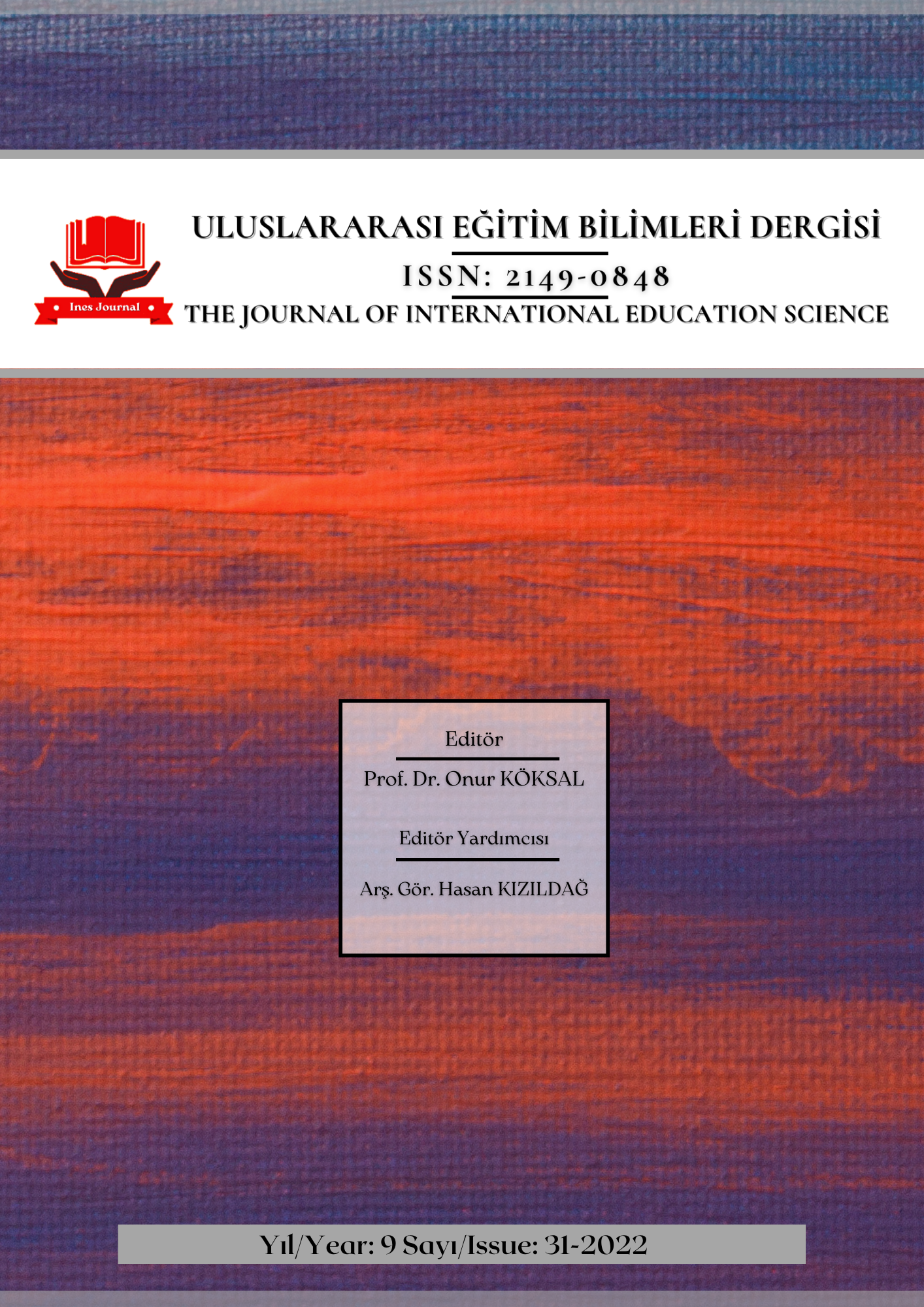Author :
Abstract
İngilizce dünyadaki milyonlarca insan tarafından kullanılan en yaygın dildir. İngilizceyi yabancı veya ikinci dil olarak kullanan insanların sayısı İngilizceyi ana dili olarak kullanan insanlardan fazladır. Uluslararası alanda iletişimin, eğitimin ve diğer bazı alanların ana unsuru olarak kullanılan İngiliz dilini kapsamlı ve yetkin bir şekilde öğrenmek diğer bazı dillerde olduğu gibi kolay değildir. İngilizce öğrenimi sürecinde öğrenci üzerinde en etkin olan faktör öğretmendir. Öğretmen açısından öğretim konusuna bakıldığında, yabancı dil öğrenci başarısına etki eden birçok önemli bileşen bulunmaktadır, Yaş, ilgi, öğrenme tarzı gibi bireysel özellik ve farklar sadece bunlardan bazılarıdır. Eğer öğretmenler öğrenciler arasındaki farklılıklar ve özellikleri göz önünde bulundurup, hedeflerine uygun stratejiler kullanırlarsa çok etkin eğitim faaliyetleri gerçekleştirebilir.
Keywords
Abstract
English is the most immensely used language by millions of people all over the world. The user number of English as their foreign / second language is considerably higher than the number of speakers who speak it as their native langue. By means of its significant role in the international area as general means of communication, education and relates areas, studying English is a remarkably difficult process. In learning English, the most important component influence on learners is teacher factor. There are also many issues that play paramount roles in foreign language learning process and affect student success in terms of teachers. Individual specialities and differences such as age, interest, learning style and etc., are some of them. If the teachers pay attention to these specialities and differences among the learners and if they can make use of the relevant strategies they can carry out very effectual language teaching activities.
Keywords
- Akmençe, E. (2019). Üniversite hazırlık sınıfı öğrencilerinin yabancı dil öğrenme strateji kul- lanımlarının farklı değişkenler açısından incelenmesi [Yayımlanmamış yüksek lisans tezi]. İnönü Üniversitesi, Eğitim Bilimleri Enstitüsü.
- Akyüz, Y. (2013). Türk eğitim tarihi m.ö 1000 - M.S. 2013. Pegem Akademi.
- Attali, J. (2007). Geleceğin kısa tarihi (Çev.: Turhan Ilgaz). İmge Kitapevi.
- Bayraktaroğlu, S. (2015). Türkiye’de yabancı dil eğitimi. Öğretmen Dünyası Yayınları.
- Bauman, Z. (1998). Globalization: The human consequences. Basil Blackwells.
- Drucker, P. (1993). Post-capitalist society. Harper Collins.
- Ehrman, M. E., Leaver, B. L. & Oxford, R. L. (2003). A brief overview of individual dif- ferences in second language learning. System, 31, 391-415.
- Ergin. M. (2019). Türk dil bilgisi (1. Baskı). Boğaziçi.
- Genç, A. (2004). Türkiye’de ilk ve ortaöğretim okullarında yabacı dil öğretimi. Kırgızis- tan Manas Üniversitesi Sosyal Bilimler Dergisi, 10, 107-111. http://yordam.manas.kg/ ekitap/pdf/Manasdergi/sbd/sbd10/sbd-10-10.pdf
- Graddol, D. (2000). The Future of English: A guide to forecasting the popularity of the English language in the 21st Century. The British Council.
- Gregersen, T., & MacIntyre, P. D. (2014). Capitalizing on language learners’ individuality, from premise to practice. Multilingual Matters.
- Griffith, C. (2007). Language learning strategies: students’ and teachers’ perceptions. ELT Journal, 61(2), doi:10.1093/elt/ccm001
- Hargreaves, A. (2003). Teaching in the knowledge society. Teachers College Pres.
- Haznedar, B. (2010). Türkiye’de yabancı dil eğitimi: Reformlar, yönelimler ve öğret- menlerimiz. Uluslararası Eğitimde Yeni Yönelimler Kongresinde sunulan bildiri, 2010, Kasım Antalya. http://www.iconte.org/FileUpload/ks59689/File/166.pdf
- Hismanoglu, M . (2012). An investigation of pronunciation learning strategies of ad- vanced efl learners. Hacettepe Üniversitesi Eğitim Fakültesi Dergisi, 43 (43), retrieved at, http://dergipark.gov.tr/hunefd/issue/7795/102028
- Ismail, S. A. (2011). Exploring students' perceptions of esl writing. English Langu- age Teaching, 4(2), 73-83.
- Lukin, L. E., Bandalos, D. L., Eckhout, T. J., & Mickelson, K. (2004). Facilitating the development of assessment literacy. Educational Measurement: Issues and Practice, 23(2), 26-32.
- Mitchel, R., & Myles, F. (2001). Second language learning: Key concepts and issues. C. Chandlin, & N. Mercer, English Language Teaching in Its Social Context. London: Routledge.
- OECD (2001). Knowledge and skills for life: First results from the programme for international student assessment. OECD.
- Oxford, R. L. (1989). Use of language learning strategies: A synthesis of studies with implications for strategy training. System, 17(2), 235-247.
- Peçenek, D. (2002). 4-6 yaş grubu çocuklarının İngilizce öğrenme süreçleri üzerine bir durum çalışması *Yayınlanmamış doktora tezi]. Ankara Üniversitesi Sosyal Bilimler Enstitüsü, Ankara.
- Richards, J. C., & Rodgers, T. S. (2002). Approaches and methods in language teaching. Cambridge University Press.
- Şimsek, H., & Özaslan, D.(2021). The Effect of student-centred methods and techniques on students’ academic achievements in teaching English: A meta-analysis study. Ankara University Journal of Faculty of Educational Sciences Year: 2021, Volume: 54, Issue: 2, 599-626. DOI: 10.30964/auebfd.740077, E-ISSN: 2458-8342, P-ISSN: 1301
- Ünalan, Ş. (2006). Türkçe öğretimi (3. Baskı). Nobel. Extended Abstract





